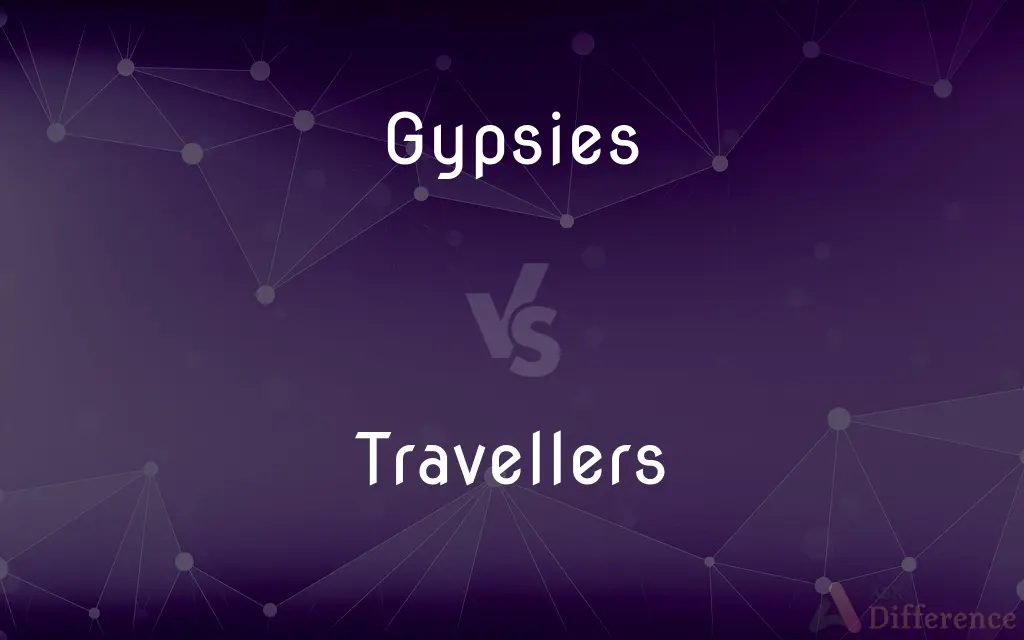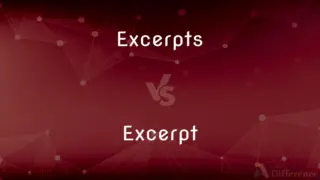Gypsies vs. Travellers — What's the Difference?
By Maham Liaqat & Fiza Rafique — Published on August 29, 2024
Gypsies are ethnically distinct groups with origins in India, known for their nomadic lifestyle across Europe. Travellers refer to various groups, including Irish Travellers and Scottish Travellers, with nomadic heritage but different ethnic backgrounds.

Difference Between Gypsies and Travellers
Table of Contents
ADVERTISEMENT
Key Differences
Gypsies, particularly the Romani people, trace their origins back to northern India and migrated to Europe around a thousand years ago. Their culture is marked by a strong sense of community, traditional occupations, and, historically, a nomadic way of life. They speak Romani, a language with Sanskrit roots.
Travellers, such as Irish Travellers and Scottish Travellers, are distinct from the Romani and have their own unique heritage and cultures. Irish Travellers, or Pavees, are recognized as an indigenous ethnic group in Ireland with their own customs, language (Shelta), and traditions. Scottish Travellers, including both occupational and ethnic Travellers, have a varied heritage with some tracing lineage back to the indigenous Highlanders.
Both Gypsies and Travellers have faced marginalization and discrimination, yet they maintain distinct cultural identities, languages, and traditions. While the term "Gypsy" has historically been used broadly, it specifically refers to the Romani people, emphasizing the importance of distinguishing between these different ethnic groups.
The nomadic lifestyle, once essential for both groups, has evolved, with many Gypsies and Travellers now living in settled communities. However, mobility remains an important cultural aspect, with some continuing to travel for work, family, and cultural reasons.
Laws and policies affecting these communities have varied over time and by region, reflecting societal attitudes towards nomadic peoples. Efforts to recognize and protect their rights and way of life continue, highlighting the need for understanding and respect for their distinct cultures.
ADVERTISEMENT
Comparison Chart
Origins
Northern India
Ireland, Scotland, and other regions
Language
Romani, with Sanskrit roots
Shelta (Irish Travellers), among others
Cultural Identity
Distinct ethnic group with unique traditions
Distinct groups with their own traditions
Lifestyle
Historically nomadic, now often settled
Historically nomadic, with many now settled
Discrimination and Marginalization
Common historically and presently
Common historically and presently
Legal Recognition
Varied by country; often unrecognized
Irish Travellers recognized as ethnic group in Ireland
Compare with Definitions
Gypsies
Gypsies have a rich cultural tradition originating from northern India.
Gypsies celebrate the festival of Ederlezi, marking the spring season.
Travellers
Irish Travellers have a distinct language known as Shelta.
Shelta is used among Irish Travellers for communication within their community.
Gypsies
The Romani language reflects their Indian origins.
Many Romani words are derived from Sanskrit.
Travellers
Travellers have a tradition of nomadism, though many are now settled.
Irish Travellers often move in caravans for seasonal work.
Gypsies
Gypsies are known for their nomadic lifestyle, although many now live in permanent settlements.
Traditional Gypsy caravans are a symbol of their nomadic heritage.
Travellers
Travellers have unique cultural practices and social structures.
Irish Travellers maintain a strong tradition of storytelling.
Gypsies
Gypsies have faced significant discrimination throughout history.
Gypsies were targeted during the Holocaust.
Travellers
Scottish Travellers include diverse groups with different origins.
Some Scottish Travellers descend from displaced Highlanders.
Gypsies
Gypsy crafts and music have influenced European culture.
Flamenco music has Romani influences.
Travellers
Discrimination against Travellers has been a longstanding issue.
Travellers face barriers in education and employment.
Gypsies
The Romani language.
Travellers
One who travels or has traveled, as to distant places.
Gypsies
A member of any of various traditionally itinerant groups unrelated to the Romani.
Travellers
A member of any of various groups of traditionally itinerant people living especially in Scotland and Ireland.
Travellers
Plural of traveller
Common Curiosities
Are Gypsies and Travellers the same?
No, while both have a nomadic heritage, they are distinct in terms of ethnic origins, language, and culture.
Do Gypsies and Travellers still live a nomadic lifestyle?
Many have settled, but nomadism remains an important cultural aspect for some members of these communities.
Are there efforts to preserve Gypsy and Traveller cultures?
Yes, there are numerous initiatives aimed at preserving their languages, traditions, and rights.
What is being done to combat discrimination against Gypsies and Travellers?
Advocacy and legal protections have been established in some regions, though challenges remain.
How do Gypsies and Travellers educate their children?
Education methods vary, with some attending public schools and others receiving education within their communities.
What languages do Gypsies and Travellers speak?
Gypsies speak Romani, while Travellers may speak languages like Shelta among Irish Travellers.
How are Gypsies and Travellers recognized legally?
Recognition varies by country; for example, Irish Travellers are recognized as an ethnic group in Ireland.
Why do Gypsies and Travellers face discrimination?
Discrimination often stems from misunderstandings, stereotypes, and historical marginalization of their way of life.
Can Gypsies and Travellers own property?
Yes, many Gypsies and Travellers own homes or land, though some continue to travel for parts of the year.
How do Gypsies and Travellers celebrate their heritage?
Celebrations include festivals, music, storytelling, and maintaining traditional crafts and customs.
How do Gypsies and Travellers contribute to society?
They contribute through various means, including traditional crafts, music, trade, and more.
Can someone become a Gypsy or Traveller?
Gypsy and Traveller identities are tied to ethnic heritage and cultural upbringing, making it difficult for outsiders to "become" one.
Do Gypsies and Travellers pay taxes?
Like other citizens, Gypsies and Travellers are subject to tax laws, depending on their income and residency status.
How can one learn more about Gypsy and Traveller cultures?
Engaging with cultural organizations, reading literature by Gypsy and Traveller authors, and attending cultural events are good starting points.
Are there different types of Travellers?
Yes, besides Irish Travellers, there are Scottish Travellers and others, each with their own distinct identities.
Share Your Discovery

Previous Comparison
Almond Bark vs. White Chocolate
Next Comparison
Excerpts vs. ExcerptAuthor Spotlight
Written by
Maham LiaqatCo-written by
Fiza RafiqueFiza Rafique is a skilled content writer at AskDifference.com, where she meticulously refines and enhances written pieces. Drawing from her vast editorial expertise, Fiza ensures clarity, accuracy, and precision in every article. Passionate about language, she continually seeks to elevate the quality of content for readers worldwide.













































